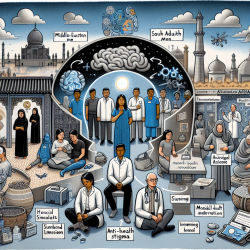Introduction
As practitioners in the field of speech-language pathology, we are always on the lookout for innovative approaches to enhance our therapeutic outcomes. A recent study published in Scientific Reports titled Psychedelics alter metaphysical beliefs offers intriguing insights that could potentially revolutionize our practice. This blog will delve into the key findings of the study and explore how these insights can be applied to improve therapeutic outcomes for children.
The Research: An Overview
The study examined whether psychedelic experiences can induce lasting changes in metaphysical beliefs. The researchers found significant shifts away from 'physicalist' or 'materialist' views towards panpsychism and fatalism after psychedelic use. These changes were positively correlated with improved mental health outcomes and were sustained for at least six months. The study also highlighted the role of emotional synchrony and psychological suggestibility in mediating these belief shifts.
Implications for Speech-Language Pathology
While the direct application of psychedelics in speech-language therapy is not feasible or ethical, the underlying principles derived from this research can be incredibly valuable. Here are some ways to implement these findings:
1. Emphasize Emotional Synchrony
The study found that emotional synchrony during psychedelic experiences played a crucial role in shifting metaphysical beliefs. In a therapeutic setting, fostering a strong emotional connection between the therapist and the child can enhance the effectiveness of interventions. Techniques such as active listening, empathetic responses, and creating a supportive environment can help achieve this.
2. Leverage Psychological Suggestibility
Psychedelics were found to increase psychological suggestibility, making individuals more open to new ideas and beliefs. In therapy, this can translate to creating a highly suggestible environment where children are more receptive to learning and adopting new communication strategies. Techniques like positive reinforcement and modeling desired behaviors can be particularly effective.
3. Integrate Mindfulness and Meditation
While psychedelics are not a viable option, mindfulness and meditation can induce similar states of heightened awareness and emotional synchrony. Incorporating mindfulness exercises into therapy sessions can help children become more attuned to their thoughts and feelings, thereby improving their communication skills.
4. Encourage Group Activities
The study highlighted the impact of collective experiences on belief shifts. Group activities can provide a similar sense of community and shared experience, which can be beneficial for children. Activities such as group storytelling, collaborative games, and peer interactions can foster a sense of belonging and enhance communication skills.
Encouraging Further Research
The findings of this study open up numerous avenues for further research in the field of speech-language pathology. Here are some potential areas of exploration:
- Long-term Impact: Investigate the long-term effects of emotional synchrony and psychological suggestibility on therapeutic outcomes.
- Mindfulness Techniques: Explore the efficacy of various mindfulness and meditation techniques in improving communication skills.
- Group Dynamics: Study the impact of different types of group activities on children's communication abilities.
Conclusion
The research on psychedelics and metaphysical beliefs offers valuable insights that can be applied to enhance therapeutic outcomes in speech-language pathology. By focusing on emotional synchrony, leveraging psychological suggestibility, integrating mindfulness, and encouraging group activities, we can create a more effective and supportive therapeutic environment for children.
To read the original research paper, please follow this link: Psychedelics alter metaphysical beliefs.










